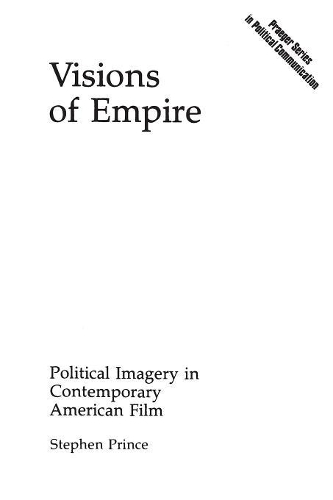
Visions of Empire: Political Imagery in Contemporary American Film
(Paperback)
Available Formats
Publishing Details
Visions of Empire: Political Imagery in Contemporary American Film
By (Author) Stephen Prince
Bloomsbury Publishing PLC
Praeger Publishers Inc
30th June 1992
United States
Classifications
Tertiary Education
Non Fiction
791.43658
Physical Properties
Paperback
232
Width 156mm, Height 235mm
369g
Description
Visions of Empire explores film's function as a medium of political communication, recognizing not just the propaganda film, but the various ways that conventional narrative films embody, question, or critique established social values underlying American attitudes toward historical, social, and political events. Stephen Prince discusses Hollywood film productions of the 1980s in terms of salient political issues of the period, including anxieties about declining U.S. military power, the wars in Central America and the prospects for U.S. intervention, the legacy of the Vietnam War, and urban decay. In analyzing these images and narratives, the author also describes and evaluates the cinematic styles available in the Hollywood tradition to filmmakers who address political issues. Chapter 1 establishes the theoretical framework by considering features of the political landscape of the Reagan era. Theories about political representation and the place of ideology in film are also examined. Chapters 2 through 5 focus on the major cycles of political films. Chapter 2 examines the new Cold War films which played upon fears of the Soviet menace (Rambo, Invasion USA, Red Dawn, and Top Gun). Chapter 3 discusses the small group of films--Under Fire, Salvador, El Norte and others--that addressed the wars in Latin America and the ways they explained the origins of the conflicts and the U.S. role therein. Various histories and mythologies on film of the Vietnam War are examined in Chapter 4 as examples of the symbolic reconstruction of social memory. Chapter 5 looks at politicized science fiction films (Blade Runner, Aliens, Robocop, and Total Recall) offering critical commentaries on the pathologies of contemporary urban society and capitalism.
Author Bio
STEPHEN PRINCE is Assistant Professor of Communication Studies at Virginia Polytechnic Institute and State University. He has written articles for publications such as Cinema Journal, Wide Angle, Journal of Film and Video, and Journal of Popular Culture, and is the author of The Warrior's Camera: The Cinema of Akira Kurosawa.
